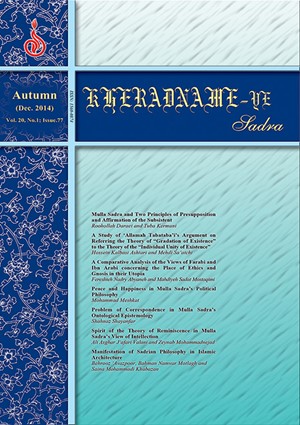Mulla Sadra and Two Principles of Presupposition and Affirmation of the Subsistent
Subject Areas :Tuba Kermani 1 , Roohallah Daraei 2
1 - University of Tehran
2 -
Abstract :
A study of the principles dominating philosophical systems reveal some new aspects of philosophers’ ideas. In this paper, by examining the principle of “the affirmation of an object for another object is presupposed for the affirmation of the subsistent”, which is known as the principle of affirmation, its consequences and its necessary interrelation with the principle of presupposition are explored. Since some authorities do not agree with the union of these two principles, while studying them, the various dimensions of their interaction are also analyzed. Some thinkers believe that they are concomitant with each other, while some others maintain that there is contrariety between them wherein the whatness and existence of each principle depends on those of the other. There are also two interpretations of the principle of presupposition which are, to some extent, rooted in accepting or rejecting the principle of the affirmation of the subsistent. Some Islamic philosophers also believe that accepting the principles of the affirmation of the subsistent and mutual copulative existence between them is one of Mulla Sadra’s innovations. They maintain that, in this way, he has put an end to the old argument of philosophers concerning the quality of the realization of secondary intelligibles and created a union between Platonists and the Peripatetics.
ابنسينا، الاشارات و التنبيهات، بهمراه شرح خواجه نصير الدين طوسي و قطب الدين رازي، قم، مطبوعات ديني، 1384.#
ابنسينا، الشفاء ـ المنطقـ البرهان، قم، كتابخانه آيت الله مرعشي،1404ق.#
جوادي آملي، عبدالله، رحيق مختوم، شرح حكمت متعاليه، قم، اسراء، 1386.#
زنوزي، ملاعلي، مجموعه مصنفات حكيم مؤسس، آقاعلي مدرس طهراني، تصحيح محسن كديور، تهران، اطلاعات، 1378.#
سبزواري، هادي، شرح منظومة حكمت، تهران، دانشگاه تهران، 1369.#
سليماني اميري، عسكري، «چيستي قاعدة فرعيت»، معارف عقلي، شمارة 6، 1386.#
سليماني اميري، عسكري، «قاعدة فرعيه و وجود محمولي»، خردنامة صدرا، شماره 23، بهار 1380.#
شيرازي، سيدرضي، درسهاي شرح منظومة حكيم سبزواري، تهران، حكمت،1383.#
شيرازي، سيدرضي، اسفار عن الاسفار، تهران، وزارت فرهنگ و ارشاد اسلامي، 1381.#
طباطبايي، سيدمحمدحسين، حاشية الكفايه، تهران، بنياد علمي فكري علامه طباطبايي، بيتا.#
طباطبايي، سيدمحمدحسين، نهاية الحكمه، تصحيح و تعليق غلامرضا فيّاضي، قم، مؤسسة امام خميني، 1381.#
ملاصدرا، الحكمة المتعاليه في الأسفار العقلية الأربعه، ج1: تصحيح و تحقيق غلامرضا اعواني، تهران، بنياد حكمت اسلامي صدرا، 1383.#
ملاصدرا، الحكمة المتعاليه في الأسفار العقلية الأربعه، ج3، تصحيح، تحقيق و مقدمه مقصود محمدي، تهران، بنياد حكمت اسلامي صدرا، 13.#
ملاصدرا، الحكمة المتعاليه في الأسفار العقلية الأربعه، ج6: تصحيح، تحقيق و مقدمه احمد احمدي، تهران، بنياد حكمت اسلامي صدرا، 13.#
ملاصدرا، الشواهد الربوبيه في مناهج السلوكيه، تصحيح و تحقيق مصطفي محقق داماد، تهران، بنياد حكمت اسلامي صدرا، 1382.#
مصباح يزدي، محمدتقي، شرح الهيات شفا، قم، مؤسسة امام خميني، 1382.#
مصباح يزدي، محمدتقي، تعليقه علي نهاية الحكمه، قم، مؤسسة در راهحق، 1405ق.#
يزدي، ملاعبدالله، الحاشية علي تهذيب المنطق، قم، مؤسسه نشر الاسلام، بيتا.#


